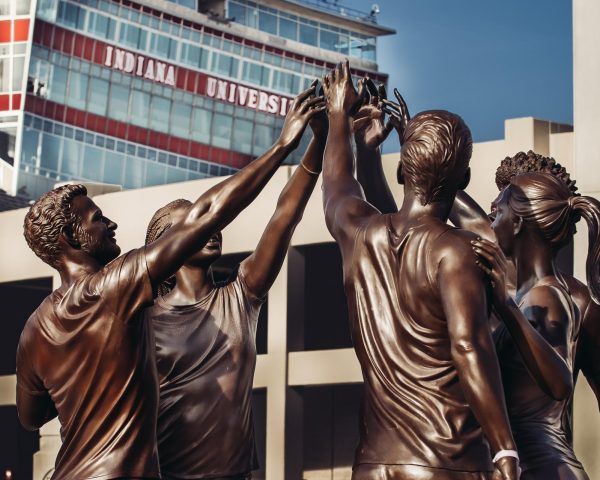Trump: A Year in Review
At the close of 2017, a year many would describe as the strangest in history, students at North, like people across America, are struggling to make sense of everything from the chaotic Trump presidency and the varying reactions from the country to its long-term significance for America and the world.
Donald Trump, New York businessman and former reality television personality, took office on Jan. 20, 2017, becoming the 45th president of the United States. One year later, when you think of President Trump, his outrageous statements, tweets and scandals are the big story, particularly the ongoing investigation into his administration’s possible collusion with Russia to take down the Democrats in the 2016 presidential election. The investigation into this scandal is, so far, comparable to the Watergate scandal of the early 1970s.
The suspicion is that Russian influencers circulated fake news stories on US social media to sway our election toward Trump. So far, the president denies any collusion with Russia, but several cabinet-level officials, including General Michael Flynn, Trump’s former National Security Advisor, and George Papadopoulos, former member of the foreign policy advisory panel, have resigned and pled guilty to various related charges, promising full cooperation in the investigation. More are rumored to be resigning soon. Ironically, had the president not shocked the nation by firing former FBI director James Comey in May of 2017, perhaps we would have no investigation.
President Trump has also proposed to eliminate Deferred Action for Childhood Arrivals, more commonly known as DACA, an Obama-era program that keeps children born in the USA to illegal alien parents from being deported. He has also made an effort to eliminate the Affordable Care Act, another Obama-era program, the repeal of which also failed. In December of 2017, Trump passed his Tax Bill, initiating a major tax cut for corporations and the wealthy, but only minor tax cuts for the middle class. As a result, political divisions are greater than ever.
And then there are President Trump’s ceaseless outrageous tweets, through which, he has even announced major policy changes. His ban of transgender individuals from the military was quickly negated by the Justice Department, but his travel ban on immigrants from Muslim nations, which was repeatedly struck down by several federal courts, finally cleared the supreme court in December.
Trump’s presidency has also brought success to his opponents. The day after Trump’s inauguration, an estimated 3 million people participated in hundreds of peaceful women’s marches across the country. The fight for women’s justice continued with the ‘#MeToo’ movement this year, in which women have shared their stories as victims of sexual misconduct.
“I’d like to think that it’s partly in response to Trump and a lot of the ideas that he perpetuates,” said North Junior and leader of the Young Democrats Club Jerrett Alexander, who sees the movement as a backlash. “A lot of women were just fed up with how they have been treated, and they wanted to say that they weren’t going to take it anymore, and I think that’s really cool to see now that it has continued, and it didn’t just end with the Women’s March.”
In other protests, Trump supporters have offended millions of Americans and further tainted the reputation of the already fragile Republican Party. In a Charlottesville, Va. protest, a rally of white supremacists marching with torches through the University of Virginia campus, uncannily resembling the Hitler Youth of the 1930s, chanted, ‘White lives matter’ and ‘Jews will not replace us.’
“I think that Trump has brought that out in people,” said a Young Republicans Club leader, who chose to remain anonymous for this story, adding that Trump’s biggest flaw is his lack of diplomacy. “I think his heart is in the right place on certain things, [and] I feel like he has an idea of what he’s doing, but the ways he approaches it, at times I don’t agree with.”
Similarly, this student believes that the President’s behavior has affected our school negatively as it relates to increased bullying incidents. “People think that if the President is doing it, they can do it, too.” Still, the student believes that the president has led the economy to an “all-time high.”
“Not all Republicans believe in some of the awful and extreme things that he says,” said a fellow Young Republicans Club leader, who also chose to remain anonymous. “He has been showing extreme immaturity for a president, and it’s awful to feel that people will group me into that if they know that I’m conservative.”
Democrats in the school seem to agree, but they believe the President doesn’t just reflect badly on his party, but also the United States.
“With Trump in office, it’s pretty much an embarrassment to the country,” said Young Democrats Club Vice President Melina Raglin. “The United States is this huge leading force that so many other countries look up to, and I think it has lowered our credibility a lot.”
Asked how these young Democrats and young Republicans came to learn so much about politics, all of the student leaders agreed on one thing: they’ve made an effort to stay informed. Democrat Alexander was forced to carve his own path in politics. Neither of his parents are political and do not vote, but he found an interest in politics at a fairly young age. He recommends a website called ‘Isidewith.com’, which helps users understand which party their views align with. He adds that another way to get involved in politics is to volunteer for local campaigns. Alexander was a fellow on the John Gregg for Governor campaign and is a current intern for the Dan Canon for Congress campaign. The Monroe County Democratic and Republican parties encourage volunteers and interns.
All of these student political leaders believe the best way to get involved is to attend a Young Democrats or a Young Republicans Club meeting, or both.
“It is nice to have a group of people that have similar and different beliefs so that you can talk to everyone and keep an open mind about everything,” said one Young Republicans Club leader.
Young Republicans Club members at North believe our country’s future depends on staying informed, whereas Raglin emphasizes party unity as the key to the Democrat’s future if they are to take back the House. Alexander also sees hope.
“I think that they’re already poised to do so, so that’s exciting, and there’s already a possibility of retaking the Senate now that they won in Alabama,” he said. He believes the trend now favors the Democratic Party.“I think that our country is on the right track, but right now I think we’re just taking a detour.”


Melina Raglin and Jerrett Alexander pose for a photo.






